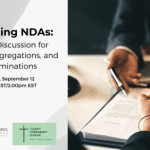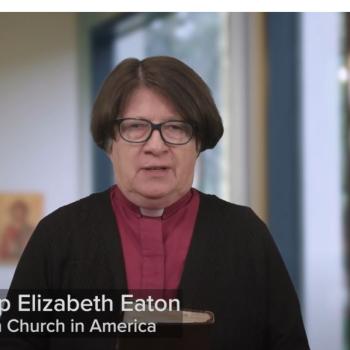Rev. Kenneth Wheeler, a Black ELCA pastor and elder stateman of the church, has written a profound and prophetic memoir that every White Christian needs to read.
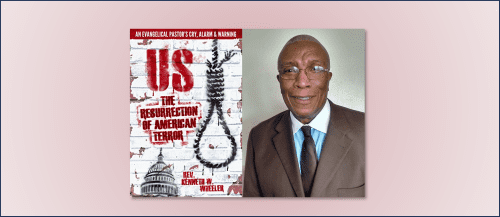
I write this review as a white woman who was baptized, confirmed, and ordained in the Evangelical Lutheran Church in America (ELCA). I did not begin to seriously engage Black Lutherans until I started my seminary studies in 1996. Like the denomination, my home congregation was 97% white and shielded me from any discussion about race during the entire time I was growing up.
Then in seminary, I was required to attend anti-racism training as a student.
The immediate defensiveness I felt when the trainer began explaining the ways in which white supremacy has harmed our siblings of color is what I clearly recall.
It has taken more than twenty-five years of continuous unraveling and untangling for God to start transforming those feelings of discomfort, guilt, shame, defensiveness, and fragility into something different. Something that perhaps resembles muscles achy from intense workouts and hands calloused from digging, pulling, and uprooting the rocks, roots, and thorns that have impeded good seed from growing.
I think this process of transformation might have happened sooner if I had been given a book like Rev. Kenneth Wheeler’s US: The Resurrection of American Terror when I was first beginning my journey of racial reckoning.
Wheeler is a retired ordained minister in the ELCA who has served the denomination for 40 years as a pastor, interim minister, and assistant to the bishop.
In those four decades, he has experienced first-hand the whiteness of the Lutheran Church in America and how it has perpetuated the sin of racism in both small and systemic ways.
[Join me for an Author Chat with Rev. Kenneth Wheeler hosted by the Clergy Emergency League on Thurs., Aug. 24, 7 p.m. Eastern. Register here.]
The church’s enslavement to whiteness
The depth of the church’s enslavement to whiteness is something I have only come to understand in the past three years as I’ve walked alongside another pastor of color, The Rev. Nelson Rabell-González. Rev. Rabell’s experiences as a Puerto Rican of African descent trying to get justice for himself and his congregation amidst racist false accusations has shown me an ugly reality. The reality is that this is a church that appears to care more about protecting itself as an institution than righting the wrongs of those most vulnerable – especially people of color who are targeted and harassed by white people in the church.
In Wheeler’s book he recounts example after example of both explicit as well as implicit racism that he experienced in the Lutheran church. He confesses, “What I struggled with my first year in seminary and what I struggled with my entire career in ministry was being in a white Church that did not know what to do with its Black pastors” (151).
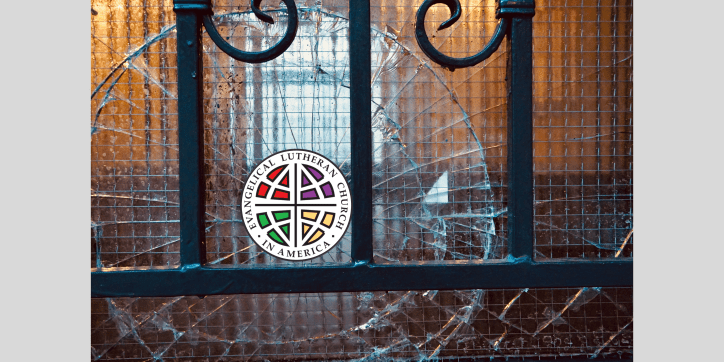
What that church has done – and continues to do – is to treat its pastors and parishioners of color as second-class citizens, as “problems” to be solved. Or the church treats them as public relations photo ops to cover over the truth about the racism embedded at every level – from congregation to synod to churchwide. And, as Rev. Rabell, as well as countless other pastors of color, have discovered first-hand, “To be accepted as a person of color in the ELCA meant that you had to conform to the standards of whiteness; those who refused to conform would always find themselves isolated or pigeonholed. Independent Black voices were, and are, seen as troublemakers” (173).
This attitude and the church’s discriminatory practices have to change. If they do not, the Spirit of God will be driven out of the ELCA (if that hasn’t happened already) and find other ways to incarnate in the people of God.
Rev. Wheeler reveals so much about his story and his family’s story that is vulnerable and risky to share.
He writes, “I have laid myself bare on these pages. I have revisited the wounds that I would have preferred to have left untouched” (240). He writes about experiences like seeing his mother manhandled by a white police officer. And being pulled over while driving because he “fit the description” of a reported criminal. Not to mention being assailed with blatantly racist comments by “good church folk” time and time again.
Putting these stories into a book certainly must have been a painful process. Yet he felt compelled to write because, “My failure to speak would be to give white supremacy and its proponents a greater voice and a greater power” (7).
Thus, his goal for the book is for readers to “understand this feeling. I want white readers to feel this in their gut. I want to stir empathy in them because if there is no empathy, whites will never be moved to act humanely towards Black people” (180).
I believe Wheeler has accomplished his goal in this book.
[Join me for an Author Chat with Rev. Kenneth Wheeler hosted by the Clergy Emergency League on Thurs., Aug. 24, 7 p.m. Eastern. Register here.]
The result of this courage to speak is a gift to congregations and clergy who are looking for a book that blends personal experience with biblical and theological framing in order to renounce and dismantle the false idol of white supremacy. Wheeler is very clear: “White supremacy does violence to God. It is a rejection of God and a rejection of God’s love” (135.
Especially as our country in the midst of an all-out assault by white nationalists against education about racism, equality, social justice, and the history of slavery and racism in the U.S., Wheeler’s book is both timely and necessary.
White folks must learn what happened to Black people in this country, why it happened, why it continues to happen, and why it is up to us to stop this assault against these children of God who just happened to be robed in darker skin.
Wheeler does not mince words or couch his prose in euphemisms. He describes his time growing up in the Deep South of Mississippi amidst the daily terrors of Jim Crow segregation. He recounts his experiences in seminary and the church dealing with a stubbornly recalcitrant denomination unwilling to confront its own complicity and contributions to Black trauma. His writing is straightforward, his descriptions are stark, and his truth is nonnegotiable.
And the truth to which he attests is one that is decidedly theological.
“If God is our Father,” he rightly argues, “it means ultimately that we are family. We are connected. We are connected in a divine and spiritual sense but we are also connected by our shared histories as Black and white people” (91).
Wheeler’s memoir is not arranged in strict chronological order that is typical of many memoirs.
Rather, it unfolds more like the layers of an excavation, taking the reader down layer by layer to the theological core that undergirds Wheeler’s convictions and reasons for writing this book. He deftly blends personal narrative with observations and commentary informed by noted scholars and thought leaders such as James Baldwin, Ta-Nehisi Coates, James Cone, and Isabel Wilkerson, to name just a few.
The effect is like looking at decades of personal and social strata where you can step forward at times to see how the layers of slavery, Jim Crow, segregation, Trumpism, and white Christian Nationalism in the U.S. have affected one man. At the same time, the book allows the reader to step back and get the scope of how this one man’s story is woven through so many layers of history. This includes the euphoria of meeting President Barack Obama early in his first term, to watching the relentless march of black bodies to their graves at the hands of white police officers and hate-filled mass shooters.
Anger is a thread that runs throughout the book. And rightfully so.
In fact, there is a chapter titled, “Don’t Dismiss My Black Anger,” in which Wheeler says this:
My Black anger is never to be dismissed because God does not dismiss it. Jesus’s cry of dereliction, My God, my God why have your forsaken me, was not just a cry of abandonment. It was a cry of anger. Jesus carried this anger to the Cross. Only the Cross could reckon with that anger. God honors all anger, but I believe he honors Black anger in particular. The Cross is the place where all enmity is reckoned with by God. (64)
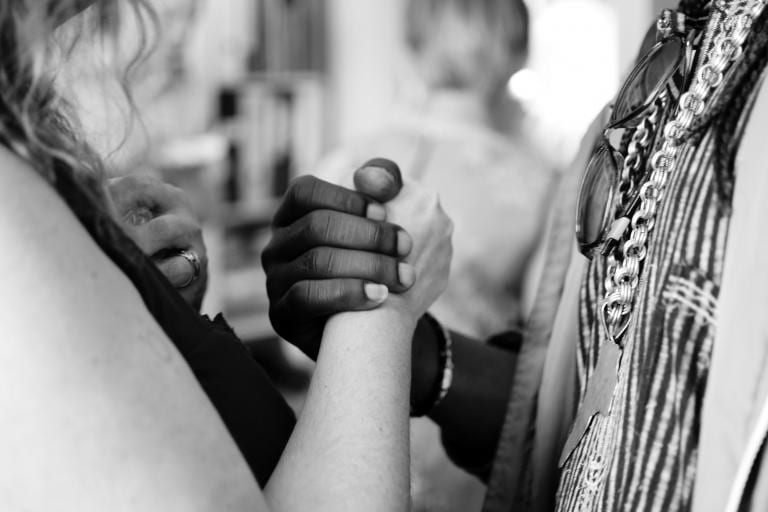
Here, Wheeler gifts white Christians with the theological framing to understand why racism is an affront to God.
In this case, he uses a specifically Christological lens. Other times he draws on lament passages such as Jeremiah Chapter 8 and Psalm 88, as well as the story of Jacob and Esau, two estranged brothers, one of whom must wrestle with God.
Wheeler also references Gospel stories such as Mark 5:1-9 (the man possessed by demons), and the story of the Prodigal Son (Luke 15:11-32), where he encourages whites to be like the younger son and “come to themselves.” In other words, we must wake up, come to our senses, and embrace our own humanity through embracing our siblings of color. Only in this way can we come home.
There are also glimpses of prophetic hope in Wheeler’s book that open up like sunbeams breaking through dense clouds.
For instance, Wheeler talks about the heart-to-heart conversations he has had with his white daughter-in-law as she underwent her own journey of racial reckoning (131). This brief interlude illustrates his instructions throughout the book for white people to approach such conversations with humility, deep listening, willingness to be changed, and the will to effect that change in society.
There is also a scene when a little white girl runs up to him after a children’s sermon during a worship service and asks loudly, “Pastor Ken, are you Jesus?”
It is a touching moment of a young white girl seeing not just this Black man’s humanity, but his capacity for being a God-bearer in his role as a pastor. This “out of the mouths of babes” question disarmed the congregation as well as Rev. Wheeler. And it demonstrated that the white emperor has no clothes and no power when the dignity, humanity, worth, and preciousness of Black people are recognized.
The book begins and ends with a burden and a task for white America, especially white Christians.
At the end of the introduction, he states plainly, “White supremacy is not a problem for Black people to solve. This task belongs to white America. I place that task in your hands” (9).
And then he proceeds to give readers a guided tour to help us find our way into that task of understanding, disrupting, and countering white supremacy.
Toward the end, he says, “I give you (white Christians) back your problem. I give you back the oppressive burden that you unjustly placed upon those of us with Black bodies. This was never our burden to carry. It was not of our making. We refuse to carry this burden any longer. We give you back a burden, and a lie that was never ours” (242).
May it be so, Rev. Wheeler. You have rightly convicted us. I, for one, receive that burden and renounce that lie.

The Clergy Emergency League will be hosting an Author Chat with Rev. Kenneth Wheeler on Thurs., Aug. 24, 7 p.m. Eastern. With white supremacy and Christian Nationalism rising at an alarming rate, now is the time to begin preparing congregations for standing firm and protecting democracy and vulnerable citizens in our communities. The Rev. Kenneth Wheeler will share his seven decades of experience, wisdom, and insight for how to engage in prophetic truth-telling, advocacy, and justice. This conversation is for clergy, members of congregations, democracy activists, and those concerned about the role of the church in resisting and confronting the growing threats of white Christian Nationalism. Register here.
Read also:
Reviving Dry Bones: Countering White Supremacy in Christian Nationalism
“Dem Bones” Will “Lift Every Voice and Sing”! Sermon on Ezekiel 37:1-14
Book Review – For the Facing of this Hour: Preaching that Resists White Christian Nationalism
Race, Faith, and the Climate Movement: Interview with Rev. Lennox Yearwood, Jr.

The Rev. Dr. Leah D. Schade is the Associate Professor of Preaching and Worship at Lexington Theological Seminary in Kentucky and ordained in the ELCA. Dr. Schade does not speak for LTS or the ELCA; her opinions are her own. She is the author of Preaching in the Purple Zone: Ministry in the Red-Blue Divide (Rowman & Littlefield, 2019) and Creation-Crisis Preaching: Ecology, Theology, and the Pulpit (Chalice Press, 2015). She is the co-editor of Rooted and Rising: Voices of Courage in a Time of Climate Crisis (Rowman & Littlefield, 2019). Her newest book is Introduction to Preaching: Scripture, Theology, and Sermon Preparation, co-authored with Jerry L. Sumney and Emily Askew (Rowman & Littlefield, 2023).



